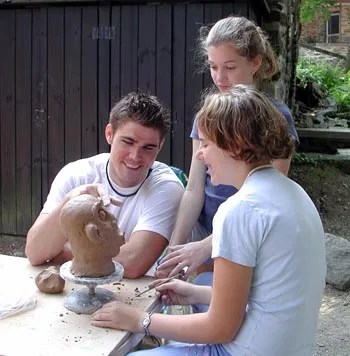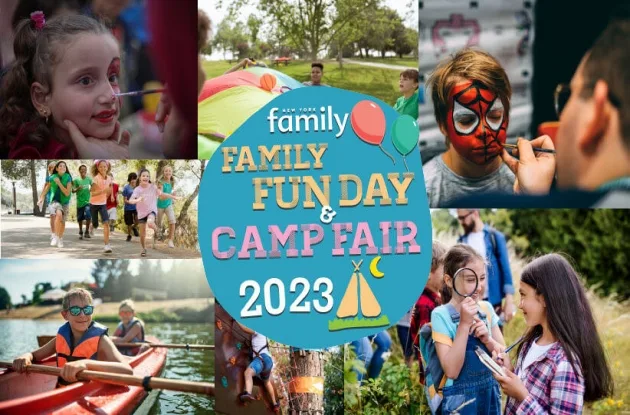Underage drinking in Westchester is an issue that has gained considerable attention in recent years with reports of alcohol use at prom outings, student trips, secret gatherings and even parentally-supervised parties.
Now the American Camp Association-New York (ACA-NY) is joining the campaign to stem the tide of underage drinking with a prevention program that will reach 3,000 underage staff and 9,800 campers ages 10 and up this summer at many of ACA-NY’s 250 affiliated day and resident camps in the greater metropolitan area. While the camps themselves are scattered throughout the region, many of their campers come from Westchester.
 Erin Kaplan, coordinator of ACA-NY’s Underage Drinking Prevention Program, explains that unlike most efforts which use scare tactics and repudiate rampant alcohol abuse, ACA-NY’s will emphasize the positive behaviors of the majority — rather than the negative behaviors of a few.
Erin Kaplan, coordinator of ACA-NY’s Underage Drinking Prevention Program, explains that unlike most efforts which use scare tactics and repudiate rampant alcohol abuse, ACA-NY’s will emphasize the positive behaviors of the majority — rather than the negative behaviors of a few.
“The unique, close-knit communities that form at summer camps are ideal for spreading affirmative messages about how most kids have fun without alcohol,” Kaplan believes.
The program was developed by Hobart and William Smith Colleges’ H. Wesley Perkins, Ph.D., an internationally recognized expert in alcohol and drug abuse prevention and co-founder of the “Social Norms Theory”. In over two decades of research, Dr. Perkins has found that young people of all ages and backgrounds believe that more of their peers are drinking alcohol than actually do, and that their peers have much more permissive attitudes toward drinking than they really have. “These misperceptions are dangerous,” Dr. Perkins says, “because young people instinctively want to fit in and thus may engage in drinking behaviors that they would not otherwise do in order to conform to what they imagine to be the norm.”
Dr. Perkins’ research shows that the way to break this vicious cycle is to correct the misperceptions by surveying groups of young people on their behaviors and attitudes, and then widely publicizing the actual, positive facts among their peers. “When young people are educated about the real way in which their peers think about and deal with alcohol and other drugs, they modify their behavior to match a more healthy reality.”
This approach has been used successfully at schools and colleges around the country, but this summer is the first time it is being implemented in the camp setting. Dr. Perkins believes that his constructive approach lends itself to the summer camp environment, where children learn compelling lessons about community, character-building, skill development and healthy living.
Doug Volan, owner/director of New Rochelle-based Mount Tom Day Camp agrees. “At summer camp, kids from a wide range of hometowns become a tight-knit community, with a shared set of values, in a very short period of time. Within days, everyone at camp — counselors and support staff included — knows what is and isn’t OK. In many ways, camps are ideal venues to promote the truth about underage drinking and to shift the misperceptions.”
As in the school settings where the Social Norms approach has been used, the ACA-NY program will begin with each participating camp surveying its own campers and underage staff on how they like to spend their time as well, as their attitudes about, experience with, and perception of alcohol use.
The fun — and norm shifting — will come as camps reveal and revel in their own survey findings throughout the camp session. They will do this through a wide variety of activities and communications channels customized to fit with the spirit of the overall camp experience. For instance, rather than simply having a workshop at which the survey results are presented, camps might share their results through games of Camper Family Feud. Results will be broken down by age group and T-shirts can be made for each subset trumpeting the percentage of campers who don’t drink. In arts and crafts, campers can make posters and banners to hang in and around their bunks highlighting their key findings. Camps with a computer bent might have campers create screen savers that scroll the positive survey results. Announcements can be made at the mess hall and key messages might even be stamped on napkins and paper cups.
When Jani Brokaw Williams, director of Mahopac-based Campus Kids Summer Camps, first heard about the program, she had reservations, but once she learned how it would be implemented, she embraced it. “I was worried it wouldn’t be appropriate for the camp setting, but in fact the opposite is true. Not only has ACA-NY provided a range of programming options my campers will love, but they’re also willing to help me customize the programming for the particular kids our Port Jervis camp draws.”
At the end of their camp sessions, participants will be surveyed again to see how their attitudes and perceptions have changed. The longer they are exposed to the program the better, but whether campers are enrolled in camp for a short or long period of time, the program is expected to have a positive impact and participants should leave with more realistic norms and healthier attitudes about alcohol use.
ACA-NY’s Underage Drinking Prevention Program is made possible by Congressman John Sweeney and generous funding from the U.S. Office of Juvenile Justice and Delinquency Prevention. For a list of participating camps, please contact ACA-NY toll free at (800) 777-CAMP.



















